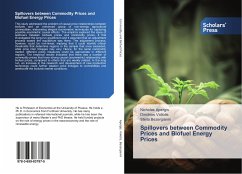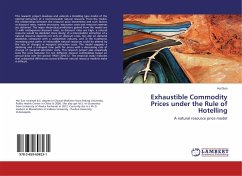
Can Commodity Futures Prices Forecast Future Spot Prices?
Economic Theory and Empirical Evidence from the Oil Market
Versandkostenfrei!
Versandfertig in 6-10 Tagen
32,99 €
inkl. MwSt.

PAYBACK Punkte
16 °P sammeln!
Commodity futures prices are widely used as a tool for forecasting and predicting future commodity spot prices. Indeed, commodity futures prices do have certain forecasting power. However, their explanation power is strongly limited. In particular, this thesis tests whether WTI and Brent crude oil futures prices can forecast future spot prices accurately. Based on economic theory and two conflicting research views, we apply an OLS regression in order to show the empirical poorness of WTI and Brent crude oil futures prices as forecasting agents of future spot prices. In addition, we reject the ...
Commodity futures prices are widely used as a tool for forecasting and predicting future commodity spot prices. Indeed, commodity futures prices do have certain forecasting power. However, their explanation power is strongly limited. In particular, this thesis tests whether WTI and Brent crude oil futures prices can forecast future spot prices accurately. Based on economic theory and two conflicting research views, we apply an OLS regression in order to show the empirical poorness of WTI and Brent crude oil futures prices as forecasting agents of future spot prices. In addition, we reject the null hypothesis of an unbiased and efficient market for the majority of the analyzed WTI and Brent futures contracts. We provide both theoretical and empirical evidence indicating that WTI and Brent futures prices cannot forecast future spot prices accurately.












